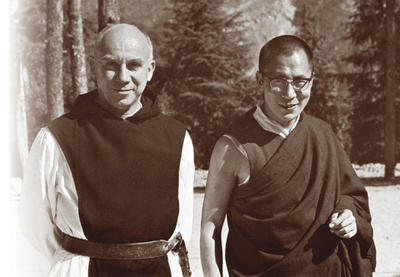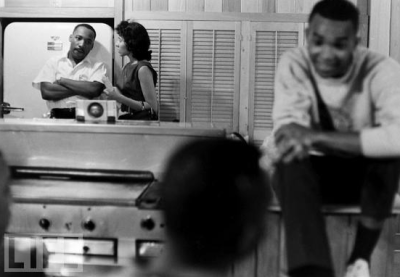#
 Thomas Merton with His Holiness
Tenzin Gyatso, the 14th Dalai Lama.
Thomas Merton with His Holiness
Tenzin Gyatso, the 14th Dalai Lama.
(Source: gazealongtheopenroad)
#
 From Life Magazine,
new pictures of Martin Luther King, Jr:
From Life Magazine,
new pictures of Martin Luther King, Jr:
“
The naked faith that enables us to bear the apparent
futilities and failures of ordinary life is not made stronger or more
pure when it is clothed in facile explanations. Pious rationalizations
which pretend to justify “the ways of God to men” often generate more
doubt than courage and distract our hearts from the difficult labor of
freely accepting what we actually are.
”
- Thomas Merton, Contemplation in a
World of Action (48)
#
“
By closing down monasteries, the West came to rely exclusively
on the intellect in its quest for God. But the way to know God, Father
Maximos would say repeatedly, is neither through philosophy nor through
experimental science but through systematic methods of spiritual
practice that could open us up to the Grace of the Holy Spirit. Only
then can we have a taste of the Divine, a firsthand, experiential
knowledge of the Creator. Otherwise, he continued, ‘we remain stuck on
the level of mere beliefs and ideologies.’
”
- Kyriacos C. Markides, The Mountain
of Silence: A Search for Orthodox Spirituality (via redviena)
#
 Thomas Merton with His Holiness
Tenzin Gyatso, the 14th Dalai Lama.
Thomas Merton with His Holiness
Tenzin Gyatso, the 14th Dalai Lama.(Source: gazealongtheopenroad)
“
The most questionable [of our presuppositions] is our
persistent conviction that consists of questions and answers, and that
“problems” and “decisions” and “choices” are of overwhelming importance,
so that at every moment we have to be thinking of right and wrong,
commitment or evasion, sincerely or insincerity, maturity or immaturity.
We keep all these questions going full blast every waking hour of the
day and even during the hours when we ought to be asleep, and we drive
the young monk to torment himself with these questions even more than we
torment ourselves. Perhaps our problems consists in wanting to have
problems and consequently creating them out of nothing in order to seek
solutions!
”
- Thomas Merton, Contemplation in a
World of Action (48)
#
“
For as a young person becomes clearer in his own mind of
his role in society and of his personal identity, he is likely also to
become more aware of how he differs from others. Gradually he becomes
conscious of his isolation from others, not because others are pulling
away, but because the fullness of personal identity cannot be achieved
with some degree of aloneness. Here there is a paradox: the more richly a
person lives, the more lonely, in a sense, he becomes. And as a person,
in this formative isolation, becomes able to appreciate the moods and
feelings of others, he also becomes more able to have meaningful
relationships with them.
But the unwritten code of our national culture prohibits aloneness, and this is the second causative factor for a prolonged identity crisis: the obstacles our society imposes to prevent personal reflection.
” - Barry McLaughlin, S.J., Nature, Grace and Religious Development (46-7)
#
But the unwritten code of our national culture prohibits aloneness, and this is the second causative factor for a prolonged identity crisis: the obstacles our society imposes to prevent personal reflection.
” - Barry McLaughlin, S.J., Nature, Grace and Religious Development (46-7)
“
If modern man, seeking his true self, seeking the existential
atmosphere of an exploration that has not been determined beforehand,
comes to a monastic life and discovers that all his questions are
answered in advance, all his decisions are made for him, all his
movements are expected to fit in with a rigid logical necessity of black
and white, absolute right and wrong, he may try earnestly to accept the
answers, and may seem to succeed for a few years. But in the end he
will feel as frustrated in the monastery as he did in the world. He will
not find himself because he will not be able to seek himself. He will
simply have been told who and what he is expected to be.
”
- Thomas Merton, Contemplation in a
World of Action (41)
#
“
The need for spiritual liberation, the need for vision, the
hunger and thirst for that perfect “justice” which is found in total
surrender to God as love to the Beloved: these are the only real
justifications for the monk’s wilderness life and his desert pilgrimage.
If these are systematically frustrated, and if institutional
formalities are everywhere substituted for the inner desire of holiness
and union, monks will not remain in the monastery.
”
- Thomas Merton, Contemplation in a
World of Action (24)
#
“
The monk has a quiet, relatively isolated existence in which
it is possible to concentration more on the quality of life and its
mystery and, thus, to escape in some measure from the senseless tyranny
of quantity.
”
- Thomas Merton, Contemplation in a
World of Action (10)
#
“
The beginning of our happiness lies in the understanding that
life without wonder is not worth living. What we lack is not a will to
believe but a will to wonder.
”
- Abraham Joshua Heschel(Source: honor-not-honors, via redviena)
#
 From Life Magazine,
new pictures of Martin Luther King, Jr:
From Life Magazine,
new pictures of Martin Luther King, Jr:It is the spring of 1961, and in the kitchen of a safe house in Montgomery, Alabama, the Reverend Dr. Martin Luther King Jr. looks tense, perhaps worried. As a volunteer bends his ear, the 32-year-old civil rights leader glances toward one of the 17 students hunkered down with him — fresh-faced college kids who, moved by King’s message of racial equality, have risked their very lives. The past two weeks have been harrowing for these young people — the “Freedom Riders,” they are called — as they inch across the state on integrated buses, their numbers diminished at every stop in the face of arrests, bloody mob beatings, fire-bombings. There to capture the mood in the room as the group plans its next brave move — a ride into Jackson, Mississippi — is LIFE photographer Paul Schutzer, who covered the “Prayer Pilgrimage for Freedom” four years earlier and had seen firsthand the kind of courage and determination King could inspire in his followers. Now, nearly 50 years after these Freedom Rides and in celebration of King’s birthday, LIFE.com presents never-seen photos taken by Schutzer, tracking King and the nation-changing movement he led, from the monuments of Washington to the streets of the Deep South.(via slaughterhousefive)
NEVER-SEEN: MLK & the Freedom Rides
No comments:
Post a Comment